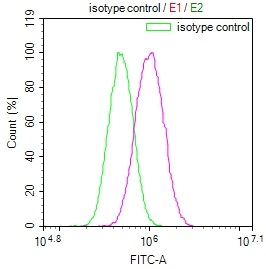Alternative Names
Mucosal addressin cell adhesion molecule 1 (MAdCAM-1) (hMAdCAM-1), MADCAM1
Immunogen
A synthesized peptide derived from human MADCAM1
Immunogen Species
Homo sapiens (Human)
Purification Method
Affinity-chromatography
Concentration
It differs from different batches. Please contact us to confirm it.
Buffer
Rabbit IgG in 10mM phosphate buffered saline , pH 7.4, 150mM sodium chloride, 0.05% BSA, 0.02% sodium azide and 50% glycerol.
Tested Applications
ELISA, FC
Recommended Dilution
| Application |
Recommended Dilution |
| FC |
1:50-1:200 |
Storage
Upon receipt, store at -20°C or -80°C. Avoid repeated freeze.
Lead Time
Basically, we can dispatch the products out in 1-3 working days after receiving your orders. Delivery time maybe differs from different purchasing way or location, please kindly consult your local distributors for specific delivery time.
Description
The production of the MADCAM1 recombinant monoclonal antibody entails a meticulous and standardized process to ensure its quality and specificity. Initially, B cells are isolated from an immunized animal using the synthesized peptide derived from human MADCAM1 as the immunogen. Following that, total RNA is extracted from the isolated B cells and converted into cDNA through reverse transcription. The MADCAM1 antibody genes are then amplified using PCR with primers specific to the antibody constant regions and inserted into an expression vector. This expression vector is subsequently introduced into host cells, enabling the production of the MADCAM1 recombinant monoclonal antibody. The antibody is harvested from the cell culture supernatant and purified using affinity chromatography, resulting in a highly purified preparation. Rigorous characterization assays, including ELISA and FC analysis, are performed to validate the antibody's specificity and functionality, ensuring its precise binding to human MADCAM1 protein.
Usage
For Research Use Only. Not for use in diagnostic or therapeutic procedures.




